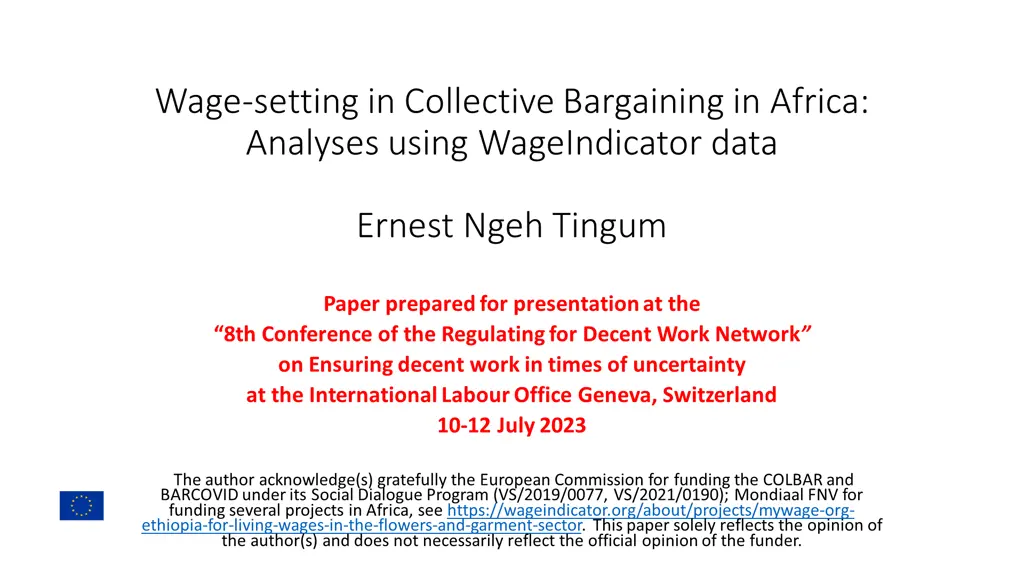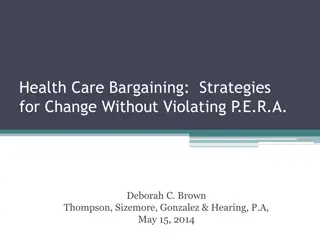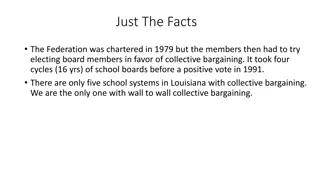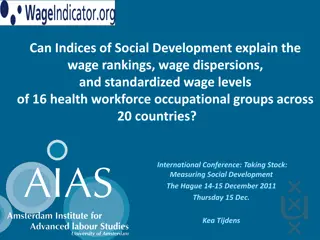Understanding Collective Bargaining: Insights on Wage Setting in Africa
Explore wage-setting systems in Africa through collective bargaining negotiations to address inequality and social justice. This paper analyzes the content of agreements using the WageIndicator database, shedding light on pay-settings and related clauses. Specific issues addressed include additional financial benefits, the role of industry sectors in wage settings, and the importance of sectors in determining wage levels.
Download Presentation

Please find below an Image/Link to download the presentation.
The content on the website is provided AS IS for your information and personal use only. It may not be sold, licensed, or shared on other websites without obtaining consent from the author. Download presentation by click this link. If you encounter any issues during the download, it is possible that the publisher has removed the file from their server.
E N D
Presentation Transcript
Wage-setting in Collective Bargaining in Africa: Analyses using WageIndicator data Ernest Ngeh Tingum Paper prepared for presentation at the 8th Conference of the Regulating for Decent Work Network on Ensuring decent work in times of uncertainty at the International Labour Office Geneva, Switzerland 10-12 July 2023 The author acknowledge(s) gratefully the European Commission for funding the COLBAR and BARCOVID under its Social Dialogue Program (VS/2019/0077, VS/2021/0190); Mondiaal FNV for funding several projects in Africa, see https://wageindicator.org/about/projects/mywage-org- ethiopia-for-living-wages-in-the-flowers-and-garment-sector. This paper solely reflects the opinion of the author(s) and does not necessarily reflect the official opinion of the funder.
Introduction Collective bargaining is the process of negotiation between employers and employees, usually through their representatives, to determine the terms and conditions of employment The purpose of these negotiations is to establish working conditions and employment terms (Hayter and Stoevska, 2010) Wage-setting in collective bargaining are important components of labour market institutions that have a significant impact on labour market outcomes decentralised level in which individual firms and workers determine wages, centralised system where employers negotiate wages with trade unions (Bhuller et al., 2022).
In Africa, wage-setting and collective bargaining systems have been established to address issues of inequality and social justice. While some countries have centralized wage-setting systems, others have decentralized systems that allow for more negotiation at the local level. However, there is a lack of empirical research on the effectiveness of these systems in Africa which relates to lack of data on CBAs Very little is known about what exactly is agreed in these collective bargaining agreements (Besamusca and Tijdens, 2015, 87). Two databases with collective bargaining agreement text covering Africa are available in this respect: the WageIndicator database, and the AGREED This paper using the WI database to comprehensively understand of the content agreements with respect pay-settings and related clauses
The following issues are specifically addressed in this paper: (1) apart from wages, how many additional financial benefits are agreed within the agreements in African countries? (2) how important are the sectors of industry in wage settings? (3) how important are sectors of industry in wage level determination? Methodology First, apply descriptive statistics to analyse additional financial benefits. Second, the logistic model applied to the trigger question Does the agreement have clauses on wages [YES/NO]? . Third, the multinomial logit model is applicable to the question, Where are the wages determined [INDIVIDUAL LEVEL/COMPANY LEVEL /SECTORIAL LEVEL/ ELSEWHERE]? .
Collective Bargaining agreements per country Collective Bargaining agreements per country Number of agreements signed in the Private Sector Single Enterprise bargaining agreements Number of agreements Ratified Languageof the agreement Country Number Burundi Benin Ethiopia Ghana Guinea Kenya Lesotho Madagascar Malawi Mozambique Niger Rwanda Senegal Sierra Leone South Africa Zimbabwe Togo Uganda Tanzania Zambia Total 19 23 66 38 1 90 5 13 3 11 7 4 28 2 3 10 16 29 34 22 424 17 19 53 25 1 7 1 6 1 7 4 3 22 2 1 4 5 12 22 18 2 18 18 66 38 0 78 4 9 2 11 4 4 3 0 2 0 1 19 32 22 French French English English French English English French English Portuguese French English French English English English French English English English 10 66 33 1 89 5 12 3 10 3 3 23 1 3 10 13 25 33 10 230 (54.2%) 355 (83.7%) 331 (78.1%)
Share of collective agreements that include additional financial benefits clauses per country (in percentages) Share of collective agreements that include additional financial benefits clauses per country (in percentages) Health Insurance pay Standby or on-call Premium Extra Leave premium Maternity Pay Disability pay Severance Pay Yearly Bonus Eveningg Premium Overtime premium Hardship premium Sunday Premium Transport Allowance Seniority Allowance Country No Burundi 19 15.79 80 15.79 25 35.71 14.29 0 7.14 35.71 0 0 21.43 28.57 Benin 23 39.13 88.89 73.91 60.87 31.82 52.38 0 47.62 86.36 40.91 45.45 63.64 22.73 Ethiopia 66 90.91 44.44 51.52 31.91 27.78 5.41 2.7 0 54.29 2.78 16.22 29.73 0 Ghana 38 84.21 77.14 94.74 84.21 81.08 62.16 43.24 8.11 83.78 11.11 66.67 45.95 64.86 Guinea 1 0 100 100 100 100 100 0 0 100 100 100 0 100 Kenya 90 84.44 59.55 95.56 27.27 23.86 35.23 1.16 86.05 100 2.35 74.12 29.76 11.63 Lesotho 5 0 0 0 0 0 0 0 0 0 0 0 0 0 Madagascar 13 76.92 69.23 46.15 38.46 46.15 53.85 0 38.46 76.92 7.69 53.85 30.77 53.85 Malawi Mozambique 3 0 0 0 0 0 100 70 0 0 0 0 0 0 0 100 63.64 0 11 80 100 36.36 50 30 63.64 9.09 10 18.18 Niger 7 57.14 71.43 71.43 42.86 42.86 0 14.29 14.29 71.43 14.29 28.57 71.43 85.71 Rwanda 4 75 100 25 33.33 50 0 0 50 50 0 0 25 0 Senegal 28 21.43 80 96.43 12.5 17.86 64.29 3.57 50 82.14 14.81 48.15 21.43 77.78 Sierra Leone 2 100 50 100 100 100 100 0 100 100 100 100 50 50 South Africa 3 100 50 0 100 66.67 33.33 66.67 0 33.33 0 0 33.33 33.33 Zimbabwe 10 100 80 80 77.78 75 40 0 10 90 0 40 60 20 Togo 16 50 100 87.5 64.29 53.33 60 0 13.33 86.67 13.33 60 73.33 80 Uganda 29 37.93 78.57 44.83 50 25.93 17.86 7.14 26.92 39.29 3.57 21.43 25.93 25 Tanzania 34 44.12 66.67 67.65 57.58 38.71 35.48 9.68 70.97 70 3.23 41.94 58.06 51.61 Zambia 22 63.64 42.86 54.55 43.75 50 20 5 55 75 20 70 40 40 Total 424 62.74 66.57 67.92 44.35 39.51 36.76 7.59 43.29 76.36 9.29 47.81 39.78 34.42
Descriptive statistics of variables Descriptive statistics of variables Frequency Mean S.D. Min Max Dependent Variables Wage trigger 374 0.882 0.323 0 1 Yes No 50 0.118 0.323 0 1 Level of wage determination Individual level 190 0.636 0.482 0 1 Company level 31 0.104 0.305 0 1 Sectoral level 32 0.107 0.309 0 1 Elsewhere ( state, regional ) 78 0.154 0.361 0 1 Independent Variables 230 0.542 0.499 0 1 Ratified collective Bargaining 355 0.837 0.369 0 1 Private sector Bargaining 331 0.789 0.408 0 1 Single Employer Bargaining 306 0.722 0.449 0 1 English collective Bargaining 134 0.321 0.467 0 1 Manufacturing Sector 62 0.148 0.356 0 1 Agriculture and forestry sector 26 0.062 0.242 0 1 Construction sector 38 0.091 0.288 0 1 Transportation and Storage 29 0.069 0.254 0 1 Accommodation and food service 37 0.089 0.284 0 1 Financial and Insurance 20 0.046 0.209 0 1 Public Administration and defence 22 0.053 0.223 0 1 Education sector 27 0.065 0.246 0 1 Social work and other services
Sectoral impact and wage setting in collective agreements: Probability of inclusion of Sectoral impact and wage setting in collective agreements: Probability of inclusion of wage wage clauses clauses in in agreements (1) (2) (3) Coefficients CBA Ratified 0.997*** 0.987*** 0.0886*** (0.380) (0.379) (0.0336) agreements (4) (5) (6) Variables Marginal effects Marginal effects (at mean) 0.0669*** (0.0254) 0.0891*** (0.034) 0.0676*** (0.0256) Single Employer -1.182* (0.643) 1.704*** (0.599) 1.291* (0.746) 0.507*** (1.086) -1.115* (0.649) 1.880*** (0.591) -0.1051* (0.0573) 0.1516*** (0.0529) 0.1148* (0.0661) 0.0451*** (0.0967) -0.1006* (0.0586) 0.1696*** (0.053) -0.0794* (0.041) 0.1145*** (0.0371) 0.0867* (0.0501) 0.0341*** (0.0727) -0.0763* (0.0418) 0.1286*** (0.0368) English countries Private sector Manufacturing 0.583** (1.086) 0.0526** (0.0981) 0.0399** (0.0741) Agriculture -1.426* (1.091) 2.259** (1.145) -0.918 (1.173) -0.56 (1.207) 0.263*** (1.282) -1.489* (1.089) 2.201* (1.141) -0.952 (1.172) -0.636 (1.206) 0.025*** (1.273) -0.1268* (0.097) 0.2009** (0.1013) -0.0817 (0.1044) -0.0498 (0.1075) 0.0234*** (0.114) -0.1344* (0.0982) 0.1986* (0.1024) -0.0859 (0.1058) -0.0574 (0.1089) 0.0022*** (0.1149) -0.0957* (0.073) 0.1517** (0.0771) -0.0617 (0.0785) -0.0376 (0.0808) 0.0176*** (0.0861) -0.1019* (0.0742) 0.1506* (0.0781) -0.0652 (0.0799) -0.0436 (0.0822) 0.0017*** (0.0871) Construction Transportation Accommodation Financial sector Public Admin -3.474** (1.398) -2.459* (1.267) -0.3090** (0.124) -0.2219* (0.1142) -0.2333** (0.0908) -0.1683** (0.0842) Education sector -2.749** (1.258) -1.112 (1.29) 7.403*** (1.474) 418 -2.239* (1.213) -0.972 (1.285) 6.289*** (1.311) 418 -0.2445** (0.1112) -0.0989 (0.1148) -0.2020* (0.1093) -0.0877 (0.116) -0.1846** (0.0836) -0.0747 (0.0865) -0.1532* (0.0816) -0.0665 (0.0876) Social works Constant Observations 418 418 418 418
Sectors of Industry and wage level determination (Multinomial levels) Sectors of Industry and wage level determination (Multinomial levels) Model 1 (1) (2) Individual Company Sectoral Model 2 (3) (4) (5) (6) (7) (8) Elsewhere Individual Company Sectoral Elsewhere Variables CBA Ratified 0.066*** -0.034 -0.015 -0.017 0.066*** -0.032 -0.013 -0.015 (3.166) -0.019 (2.179) 0.056*** (1.325) -0.045 (2.450) 0.009 (3.166) -0.019 (5.954) 0.050*** (3.537) -0.041 (6.216) 0.006 Single Employer (5.361) 0.172 (3.555) -0.134 (4.002) -0.058 (1.199) 0.020 (5.361) 0.172 (9.214) -0.124 (11.190) -0.051 (2.551) 0.019 English countries (9.803) 0.055*** (8.564) 0.015*** (5.206) 0.008 (2.759) 0.031 (9.803) (23.014) (13.791) (7.871) Private sector (4.119) 0.031** (2.641) -0.003 (1.010) 0.005** (0.314) -0.028 (0.754) 0.020 (1.814) 0.013 (4.323) 0.016 (2.175) 0.019 Manufacturing 0.031** (2.641) -0.003 0.004** (0.802) -0.030 0.018 (4.921) 0.011 0.013 (5.645) 0.016 Agriculture and forestry (3.322) 0.302* (1.819) 0.002* (1.140) -0.323 (2.688) 0.019 (3.322) 0.302* (5.529) 0.002* (2.848) -0.330 (6.803) 0.013 Construction and mining (10.337) 0.156 (0.463) 0.046 (10.444) 0.016 (2.692) -0.217 (10.337) 0.156 (0.681) 0.041 (16.304) 0.013 (5.383) -0.206 Transportation (1.633) 0.028 (2.998) -0.037 (1.459) 0.013 (1.235) -0.004 (1.633) 0.028 (7.893) -0.034 (3.710) 0.012 (4.546) -0.003 Accommodation (2.624) 0.016*** (2.374) 0.006* (1.164) 0.028 (0.512) -0.006 (2.624) 0.016** (6.350) 0.011** (3.208) 0.024 (1.097) -0.008 Financial and insurance (2.546) 0.823 (0.410) -0.663 (2.493) 0.016* (0.826) -0.176 (2.546) 0.823 (2.036) -0.714 (6.397) 0.008* (3.547) -0.184 Public Admin and defence (4.415) -0.019 (3.758) -0.048 (1.786) 0.039** (2.739) 0.028* (4.415) -0.019 (1.434) -0.054 (3.213) 0.031** (7.393) 0.010* Education (5.829) -0.031 (3.047) -0.007 (3.500) 0.017 (3.864) 0.022 (5.829) -0.031 (10.079) -0.013 (8.349) 0.013 (4.121) 0.014 Social work and services (3.199) 295 (0.470) 295 (1.486) 295 (3.063) 295 (3.199) 295 (2.496) 295 (3.384) 295 (6.150) 295 Observations
Conclusion Using data for 424 agreements across 20 African countries, the study attempted to explore the content of agreements in relation to wage settings and also show the extent of additional financial benefits included in agreements agreements in the manufacturing, financial and insurance, mining and construction sectors, English countries, and private sector are more likely to include provisions related to wages education and public administration and defence sectors are mostly set by the state unless the financial and manufacturing sectors where most wages are set in individual contracts that most agreements included clauses on maternity pay and yearly bonus. Only Guinea and Sierra Leone guarantee a majority of these premiums and allowances Ghana, Kenya, Senegal, Uganda, Tanzania and Zambia (mostly English-speaking countries) are the only countries where all the premiums and allowances are sometimes awarded Recommendation for future research: analyse the agreements that have fixed both wage scales and low/minimum wages as well as show how wage in collective bargaining agreements are compared to decent wages




























